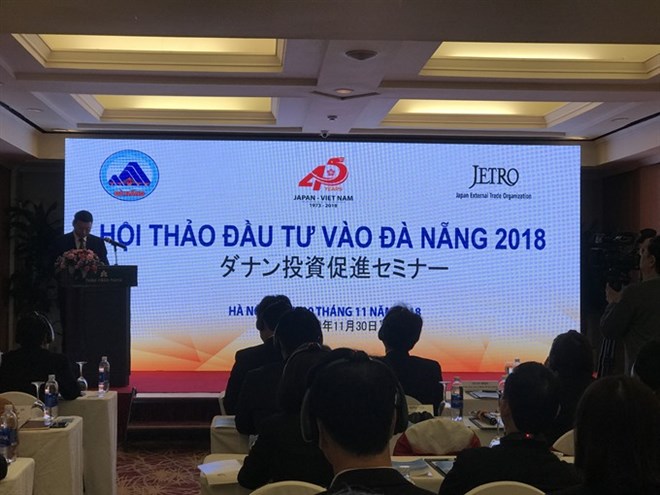
The central city of Da Nang always appreciates the contributions of Japanese enterprises to its socio-economic achievements in 30 years attracting foreign direct investment (FDI) into Vietnam.
The statement was made by Vice Chairman of
the Da NangCity People’s CommitteeHo Ky Minhat an investment
promotion conference held recently in Hanoi.
Minh said they also considered Japan as an important strategic partner for
concentrating investment attraction.
By the end of November 2018, Da Nang has attracted 670 FDI projects with total
registered capital of 2.88 billion USD. Of which, Japan has invested in 163
projects with a total registered capital of more than 675 million USD and is
the country with the largest investment projects in Da Nang.
Japan’s investment projects focus on manufacturing and processing industry as
well as information technology and communication.
These projects have created jobs for more than 20,000 local workers, providing
advanced management models, modern business methods and having a positive
impact on domestic enterprises in terms of technology innovation and product
quality.
They have also contributed to increasing export turnover and actively
contribute to enhancing the image of Da Nang in the region and also in the
world.
"Although the contribution of Japanese FDI enterprises to the development of
the city is considerable, the attraction of Japanese FDI to Da Nang is still
limited,” Minh added.
The city continues to improve infrastructure, preferential investment policies,
actively support existing investors, promote administrative reform as well as
build a transparent and favorable investment environment.
Da Nang wants to attract Japanese investors from small and medium enterprises
to multinational corporations with advanced finance and technology capabilities
to learn about investment environment and opportunities of the city in the
fields of precision mechanics, automation, information technology, hi-tech in
general and high quality services in line with the planning orientation of the
central city in the future, according to the vice chairman.
Speaking at the conference, Hironobu Kitagawa, Chief Representative of the
Japan External Trade Organisation (JETRO) said Da Nang City was very potential
for investment, however, not many Japanese firms knew about the existence of
this central city.
JETRO was trying to promote the investment opportunities to Da Nang for
Japanese companies to come here and start their business.
"Da Nang City has significant potential for developing some areas such as
information technology, food and beverages, and hotel and resorts,” Kitagawa
toldVietnam News.
The event was organised by the People’s Committeein cooperation with
JETRO. It drew the participation of more than 100 delegates from the
associations and investors from Japan.-
Source: VNA
According to data from the Hoa Binh Provincial Party Committee, the industrial production index for the first six months of 2025 is estimated to have increased by 20% compared to the same period last year. This marks the highest year-on-year growth rate for this period since 2020.
In the first six months of 2025, Hoa Binh province’s export turnover was estimated at 1.145 billion USD, marking an 18.11% increase compared to the same period in 2024. Import turnover was estimated at $ 804 million, a 17.15% increase, which helped the province maintain a positive trade balance.
The lives of the ethnic minority farmers in Tan Lac district have gradually improved thanks to the new directions in agricultural production. This is a testament to the collective strength fostered through the professional associations and groups implemented by various levels of the district’s Farmers’ Union.
With the motto the "product quality comes first,” after nearly one year of establishment and operation, Muong village’s Clean Food Agricultural and Commercial Cooperative, located in Cau Hamlet, Hung Son Commune (Kim Boi district), has launched reputable, high-quality agricultural products to the market that are well-received by consumers. The products such as Muong village’s pork sausage, salt-cured chicken, and salt-cured pork hocks have gradually carved out a place in the market and they are on the path to obtaining the OCOP certification.
In the past, the phrase "bumper harvest, rock-bottom prices" was a familiar refrain for Vietnamese farmers engaged in fragmented, small-scale agriculture. But today, a new spirit is emerging across rural areas of Hoa Binh province - one of collaboration, organisation, and collective economic models that provide a stable foundation for production.
Maintaining growing area codes and packing facility codes in accordance with regulations is a mandatory requirement for agricultural products to be eligible for export. Recently, the Department of Agriculture and Environment of Hoa Binh province has intensified technical supervision of designated farming areas and packing facilities to safeguard the "green passport" that enables its products to access international markets.


